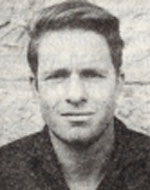Sternberg, Yitzhak-Meir
Yitzhak (Petty), son of Pnina and Yehoshua, was born on the 13th of Tishrei, October 13, 1940, in the Malachi neighborhood of Jerusalem. This is a Jewish neighborhood, rooted in God and man. Like all the children in the neighborhood, Yitzhak acquired Torah education with national and human values. Love of the homeland, fairness, honesty and love of creation and work, are prominent in its qualities. While trying to finance his studies, he worked in his youth in various jobs. Sometimes he worked in distributing newspapers before dawn, sometimes helping those who tried to write Talmudic concordance. At an early age, he joined the Ezra religious youth movement. He expressed his love for the land by plowing the country deep and wide. There was no trail in the country he did not know, and he did not know. In the collection of stamps he left behind, this love is evident. His knowledge of the Bible and of the Talmudic Talmudic edicts was decisive, and he went to study at the “Hadarom” yeshiva in Rehovot and was recruited to the Nahal Brigade after serving as a member of the ” Was assigned as a squadron commander in the Nahal Brigade, and when he completed his 81mm mortar and parachute training course, he was added as a non-commissioned mortar officer to a parachuted Nahal brigade, and at the end of his regular service, And fought with him behind the enemy lines in Sinai during the Six-Day War, and he served in the paratroopers for fifteen years and began his civil work at the Geological Survey in Jerusalem. In December 1 he married Hannah and built his home in Bat-Yam, where his two eldest sons, Zvi and Ofer, were born and raised, and throughout his life he aspired to advance in his work. , And when the economic recession destroyed the business he established, he did not abstain from work that was enough to support his family, he never lost a day’s work, and the fastest way to recovery was work. On the eve of Yom Kippur he was called to join forces with the parachutists, but he was already on the banks of the canal. In his position, he fought stubbornly and undertook voluntary tasks. On the third day of the war, on the 12th of Tishrei 5734 (October 8, 1973), when he was out of range, he fell, the day after his thirty-third birthday. He was laid to rest at the military cemetery on Mount Herzl in Jerusalem. He left behind a wife and three sons (Eyal, a year old, Ofer, three years old and Zvi, six).
